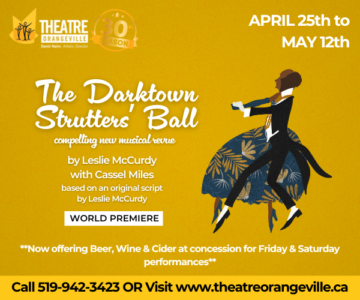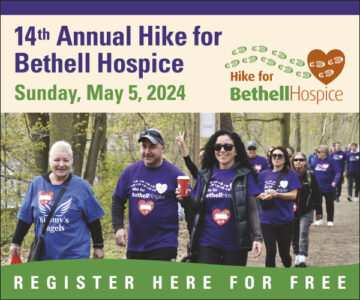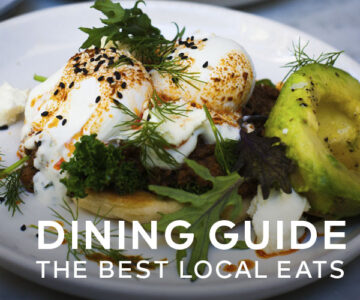Changing the Game for Adults with Autism and other Disabilities
Active Lives After School, a day program for adults with developmental disabilities is a local success story poised to help others like them.
“You are capable of amazing things!” reads a chalkboard message on the wall of an Orangeville meeting room. These aren’t just empty words. They’re the guiding ethos here at Active Lives After School, a day program for adults with developmental disabilities.
When I visit on an August day last year, the room at Lord Dufferin Centre is a hive of artistic energy. Some participants work independently, recreating a multimedia beach. Others receive step-by-step encouragement from instructor and staff member Brooke Clarke. The finished artwork ranges from astonishing emulations of the inspiration piece to more abstract uses of colour. But the magic lies in the artistic process itself. Pointing to 26-year-old Sydney’s painting, Brooke says, “You’re like Monet. Look at that texture.” Christopher, 25, reflects that energy back: “Brooke! I never used to be able to do this!”
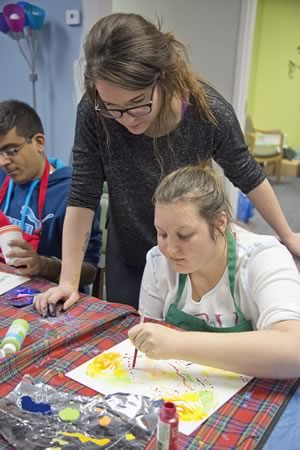
Active Lives After School participants Shaan-e-Abbas and Rachel work with art instructor and staff member Brooke Clarke during a regular art class at the Orangeville day program. Photo by Pete Paterson.
Last year, the provincial government reported that 70,000 Ontario adults live with developmental disabilities. Active Lives After School serves adults with disabilities such as autism spectrum disorder, Down syndrome and the neurological disorder Angelman syndrome. These disabilities impair cognitive function from birth, resulting in learning delays, as well as difficulties with social interactions and acquiring life skills. And they last a lifetime.
In the program’s name, “after school” refers to the critical post-high school period, during which many kids with these challenges don’t move on to post-secondary education or careers the way many of their neurotypical peers do. But as kids with developmental disabilities move into adulthood, they can still enjoy purposeful activities, work and relationships. At Active Lives, participants paint, cook and share meals at the centre and travel locally for activities such as yoga, horseback riding and swimming. Some activities, such as a theatre program, take place with peers at Community Living Dufferin in East Garafraxa. Participants in Active Lives have also started volunteering regularly in the community.
Born of necessity
But it wasn’t always that way. In 2014, nine Orangeville mothers of young adults with developmental disabilities met for coffee to discuss what would become of their children as they turned 21. Three of the children were in the final year of a special public high school program called Planning for Independence. With few desirable options for full-time care after June graduation, the transition is commonly called “aging out” or, as some advocates describe it, “falling off a cliff.” At 18, adult children with developmental disabilities lose childhood supports and funding, and though they are eligible for new funding after they turn 18, they must be reassessed and wait to qualify.
But even with funding, it can be difficult to find local programs with space for newcomers. In 2014, Community Living Dufferin had a day program open to non-residential participants, but it was full and had a waiting list.
“Some graduates had nowhere to go to fill their days,” says Sydney’s mother Sara Magee. Some parents were forced to quit their jobs to care full-time for their adult children, who in turn missed the peer interaction of high school.
So in true social entrepreneurial fashion, Sara and the other parents created their own solution. They formed Active Lives After School’s first board of directors and, in April 2015, launched a three-day-a-week, not-for-profit program.
Within two years, Active Lives grew into a full five-day-a-week affair, with attendance increasing with each new class of high school graduates. Twenty-seven families are currently enrolled, and 15 to 16 participants attend every day. Families can defray the $75 daily fee using grants from the provincial Passport program available when a child turns 18. The fees covers wages, administration, insurance and rent at the Lord Dufferin Centre. And the group raises additional funds to finance activities from private donations and two annual fundraising events.
“These parents are not agency people, and they did this,” says Kim Van Ryn, who has managed the program since 2016. In the first year, board members did the heavy lifting. They applied for and were granted charitable status, planned and held fundraisers and drove participants to outside activities. As Active Lives has grown, the board’s hands-on approach has become more arm’s-length, thanks to three full-time and four part-time staff. “They give their heart and soul to the participants,” says Sara, who became executive director of the organization.
Although Active Lives is a success story, it is part of a system no one would describe as seamless – or simple. The goal of keeping young adults with cognitive impairments at home with their families and participating in their communities is a vast improvement over the routine institutionalization of past decades, but in practice, the system is rife with funding delays and growing wait-lists for high-quality programs.
In the news
The challenges of piecing together services for these young people recently made headlines when Ontario premier Doug Ford’s government announced two changes. In February, Lisa MacLeod, minister of children, community and social services, announced reforms to the Ontario Autism Program. Advocates fear the “reforms” will cause a drop in funding to teens with autism. The government also announced that, as of April 1, it will stop funding an independent facilitation pilot program it has paid for since 2015. The program connects adults with developmental disabilities and counsellors who help them reach personal goals such as learning life skills, staying in school, finding jobs and volunteer work, and socializing in their community.
These policy churns are likely to create ripples across the system. The government maintains that the changes are aimed at eliminating logjams in care delivery, particularly the stagger ing wait lists [see sidebar]. Families can apply for increased Passport grants to try to cover cutbacks elsewhere, but they fear the net effect will be to spread overall funding more thinly.
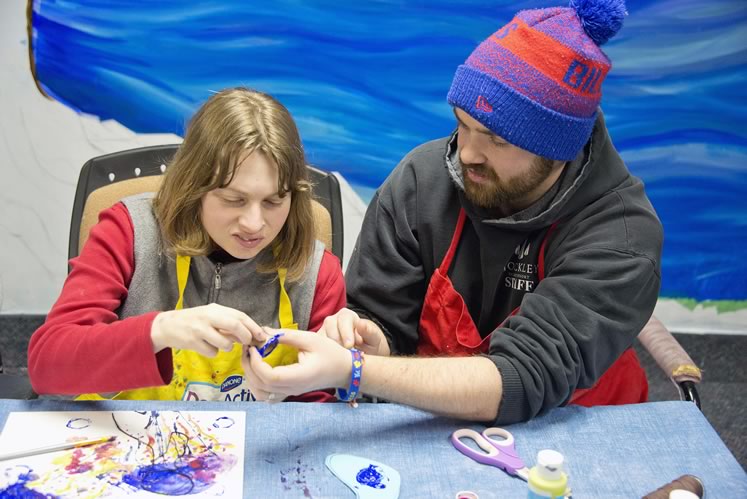
Sydney, who has been part of the program since its inception, gets a helping hand from staff member Colin Smits. Photo by Pete Paterson.
Joanna Goode, director of Facilitation Wellington Dufferin, suggests that many families will no longer be able to afford everything they need. So participants may be forced to cherry-pick among recreation programs such as Active Lives and services such as facilitation and therapy. Kim Van Ryn points out that the current minimum Passport funding of $5,000 finances only about one day a week in Active Lives – with nothing left for other services.
Still, the origin of Active Lives is one of grit and determination, and for now, the program remains on a solid footing. What’s more, the organization just received a ringing endorsement from the Ontario Brain Institute, a nonprofit research and advocacy group, in the form of a grant earmarked to help other groups tailor Active Lives programing to their needs.
Home away from home
After the August art class is over at the Lord Dufferin Centre, Orangeville-based pals Monica, 22, and Jordan, 24, head to the kitchen to tackle the day’s dishes. Staff encourage participants to show initiative and take pride in their space – because it is their space, a place where they can be vulnerable and know they will be loved and supported. It’s also where they seek sanctuary after putting their best foot forward out in the world.
Although the setting isn’t perfect – being in the basement means no windows and there is no proper stove in the kitchen – it’s also symbolic of everything Active Lives does. They work with what they have and focus on their strengths. No stove? No problem. Every year, for instance, participants find a way to prepare and deliver 1,020 bowls of soup to people in need at The Lighthouse soup kitchen in Orangeville.
And whatever its minor faults, the centre is a home away from home. There’s a quiet room with low lighting, which can be calming for some people with autism, as well as a TV room for occasional video games and a weekly afternoon movie. The pale blue walls of the group room are enlivened with colourful artwork from Brooke’s classes, each piece a testament to why this population of young adults should not be underestimated.
Both print and pictorial calendars are also posted on the walls, so all participants can clearly see what’s on each day’s agenda. Several of the participants, such as 24-year-old Palgrave resident Roberto Sansalone, are non-verbal and rely on images to communicate their needs.
One family’s journey
In 2015, Roberto’s parents, Mirian and Gian Sansalone, were among the parents looking for a day program that would suit his needs. Two of the four Sansalone children, Roberto and Dominic, 27, live with severe autism.
“Autism hurts,” says Mirian. “It hurts every day, every night. Weekends and holidays, it hurts. The pain is real and raw.”
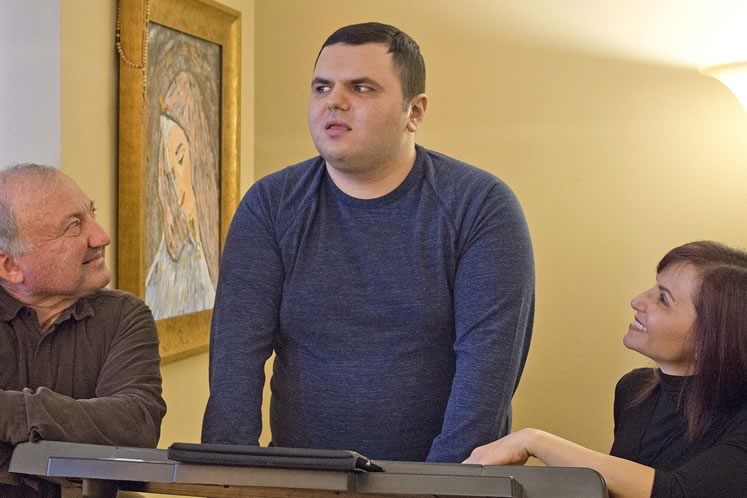
Gian and Mirian Sansalone at their Palgrave home with their son, Roberto, during his evening treadmill walk. Roberto attends Active Lives After School during the day. Photo by Pete Paterson.
But Mirian refuses to let that pain rule her family’s life, saying it has been “a sacred teacher guiding her to her true purpose and potential.” Part of this purpose was to take her family’s experiences and pour them into her 2017 memoir Purpose High: Living with Autism. In it, Mirian describes herself as old-fashioned: “I still believe that love will get me through the hardest of times. We may not understand everything, but we understand love. Where science and medicine and politics and education end, love endures and empowers. Love never ends.”
In Mirian and Gian’s search for a program for Roberto, Mirian says they were satisfied with only two local programs. “In other programs, I didn’t see the order. I didn’t like the environment. Some were in warehouse settings and I didn’t get a good feeling,” she says. Dominic was already happily settled in Brampton Caledon Community Living, but she wanted Roberto to have a few days a week in a separate program from his brother, to give each his own space.
That summer, Mirian was picking up Roberto from Teamworks Dufferin, an Orangeville day camp he had attended for a decade. Some of the parents told her they were creating something new. Mirian was thrilled. She felt confident her son would feel comfortable with Active Lives: “I knew the people. Our kids practically grew up together.” Mirian and Gian applied for Passport funding, but because of the backlog, the couple had to pay out of pocket at first and nearly lost their house. They finally received funding two and a half years after applying.
Asked how she feels when her son is participating in Active Lives, Mirian says, “I feel total peace when he goes there. It opens him up to new adventures and makes him more courageous.”
A caring culture
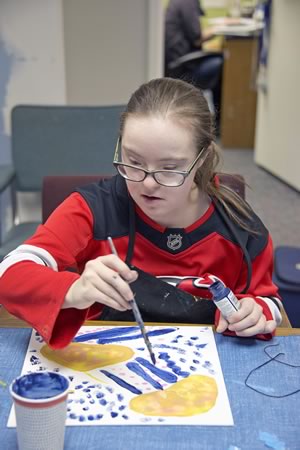
Kayla, who also loves to dance to the Backstreet Boys, creates a colourful work of art. Photo by Pete Paterson.
For the monthly Active Lives dance party, led by effervescent local dance instructor Jenee Gowing at Orangeville’s Johanis’ Karate School, participants requested their favourite songs in advance. I watch as each song is played, and it’s easy to see whose jam it is. Kayla, 22, had chosen the Backstreet Boys and on cue, the Orangeville resident effortlessly jumps into pirouettes and slides on her knees across the floor as her friends cheer, “Kayla! Kayla!”
This kind of energy fuels the staff as much as it does participants. “We are doing something radical by creating our own culture. We are unembarrassed, unafraid and unashamed of differences,” Kim says. “We have a team of utterly fearless staff who are present and engaged. They do every activity with the participants – Zumba, banging on drums, planting gardens – everything.”
She’s not kidding. On a Monday last July, Kim, who has yoga teacher credentials, led a yoga session in the basement of the Orangeville library. The class includes deep breathing, gentle stretching and quite a few spontaneous, though always encouraged, interjections. Fergus-based Lindsay, 28, calls out “Moo!!!” during the classic cow pose and “Meow!!” during its foil, the cat pose. An outpouring of laughter ensues.
After the class, Lindsay tells me what makes Active Lives so special to her. “Colin! He’s so funny!” Known for his compassion and humour, lead support staffer Colin Smits has earned Lindsay’s endorsement. If, as Kim explains, one of the goals of yoga is to calm the anxiety many of these young adults face, the sounds of laughter and all the heavy exhalations suggest that the mission was accomplished that day.
Deepening connections
Another powerful mission underscoring Active Lives is its commitment to connect participants to the community via volunteerism. Kim has crafted a bold new layer of programming called Active Lives Active Giving, which matches the group with eight other nonprofits in the area, plus Lord Dufferin Centre.
“When we work as a community, we create opportunities for every person to reach their potential, be included and thrive,” says Kim, who has personally created a clothing line called The Essential Good, featuring participants’ artwork and potentially creating revenue for the program.
“We are in a crisis for volunteers in this community, and people with disabilities have tons to give,” Kim says. “They feel proud when they can say, ‘I volunteered today.’”
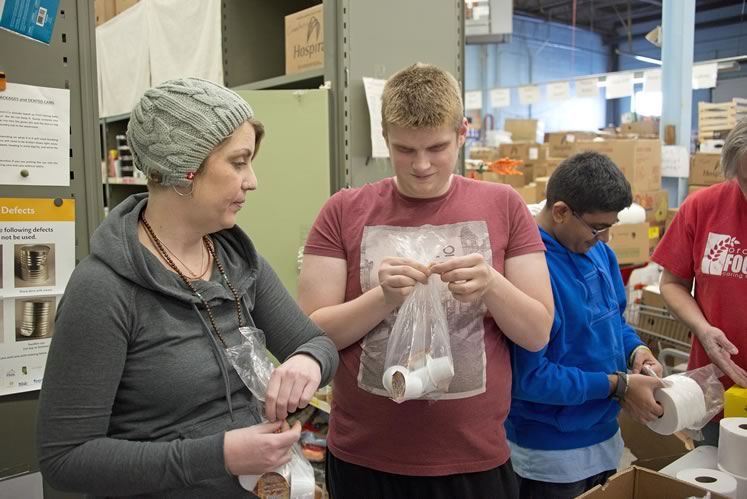
Active Lives program director Kim Van Ryn works with participant Michael during their regular volunteer stint at the Orangeville Food Bank. Photo by Pete Paterson.
I joined the group on one of their twice-monthly visits the Orangeville Food Bank, where they stock and organize hundreds of bags of dry rice and other products onto shelves. Staffer Colin beams as he watches them work. “It’s one of my biggest highlights. I’m so proud of my guys when they’re here!” he says. “It’s sometimes difficult for them to stay on task, but here, they are super driven to complete their work.”
At other volunteer jobs, the effects aren’t always as easy for them to see, Colin says. When they arrive at the food bank, the shelves are empty. When they’re finished, the shelves are full. They see the results and know there are hungry people who will be grateful for that food.
At another event, a weekly trail maintenance outing to Island Lake, Credit Valley Conservation staff explain how to help clean up the Sugar Bush Trail and the team, toting gigantic garbage bags and bright-blue-handled garbage pickers, works diligently for an hour. Jordan leads the pack, focused on clearing sticks, while 28-year-old Shaan-E-Abbas, also from Orangeville, quickly masters the finer points of the trash picker, getting every last bottle cap that is stuck in the mud.
This past year, Active Lives also partnered with Meals on Wheels, delivering hundreds of meals to seniors and people recovering from illnesses or with physical disabilities. The group volunteers at the Orangeville Library (52 hours so far), organizing DVDs and filing books. At their Lord Dufferin Centre home base, they have volunteered more than 100 hours, sweeping, shovelling walks, cleaning up flower beds and filling bird feeders. Then there’s the work they do at Habitat for Humanity’s Orangeville ReStore (more than 50 hours), where they help move furniture and organize merchandise. At the therapeutic Fiddlehead Care Farm in Mono, they’ve maintained gardens and done farm chores.
Now, Active Lives is poised to inspire others to volunteer. The Ontario Brain Institute grant gives the organization $90,000 over two years to research and produce an Active Lives Active Giving toolkit that will be offered free of charge to other organizations.
That family feeling
While their adult children are busy enjoying their days and making their marks, parents have the time to work, parent their other children, and take care of aging parents – also crucial reasons for programs like Active Lives. “It gives them eight hours every day, so they can do what they need to,” says Kim. But, she explains, parents couldn’t step away unless they were absolutely confident that the support their children receive every day feels like an extended family.
This extended-family bond is especially meaningful during tough moments. This past year, one of Active Lives’ beloved participants, Scott Van Gerven, died at age 22. This was the first time the program had gone through such a loss. Kim and the staff held a celebration of Scott’s life. In her characteristically spiritual way, Kim wrote this tribute: “Thanks Scottie for letting us walk to the edge of the river with you.”
Kim’s sentiment is echoed in the final chapter of Mirian’s book, in which she channels the sensibilities of both her non-verbal adult sons and shares their voices: “If you are meeting us for the first time, look for the light in our eyes and the potential in our hands. When you hear our sounds, listen for the will of our spirits and the song in our hearts. As we labour together, recognize that we are the same as much as we are different.”
Related Stories
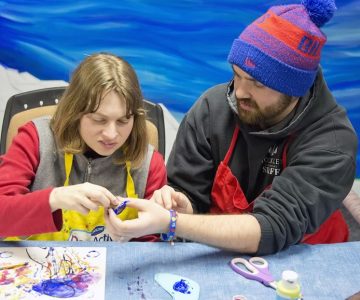
A Network of Care
Mar 19, 2019 | | CommunityHere is a rundown of programs and services currently available for teens and young adults with developmental disabilities.
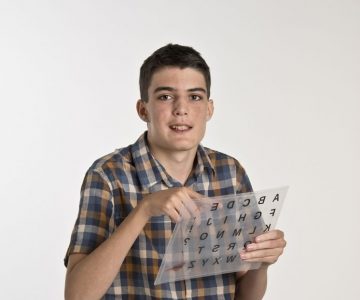
Autism Advocate: Jordyn Pallett
Nov 20, 2018 | | 25 Under 25Mono’s Jordyn Pallett writes an insightful blog about his life by pointing to letters on a transparent alphabet sheet.

Laugh Machine: Michael McCreary
Nov 20, 2018 | | 25 Under 25Mono’s Michael McCreary uses his stand-up to shed light on what it’s like growing up and dealing with social situations as someone with Asperger’s.
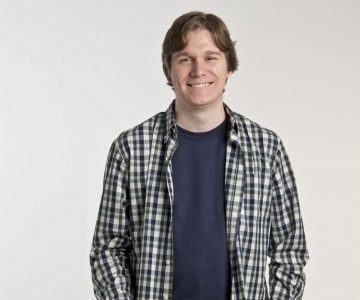
Game Whiz: Coulter Baker
Nov 20, 2018 | | ArtsMelancthon’s Coulter Baker is a professional game designer – and Sheridan educator.

Soothing the Senses
Mar 31, 2013 | | Back IssuesSensory gardens engage the senses and reduce stress. Textures, such as the soft, furry leaves of woolly lamb’s ear, encourage touching…
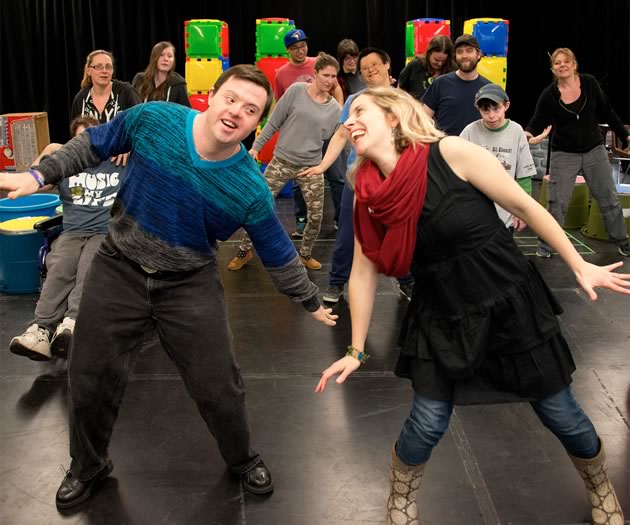
Expressive Arts at Community Living Dufferin
Sep 11, 2015 | | ArtsAt Community Living Dufferin, the arts open up exciting new ways of communicating – and strutting their stuff to the world.


